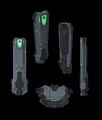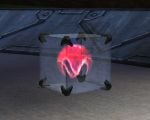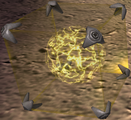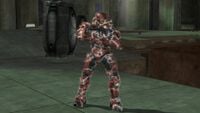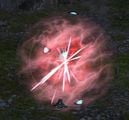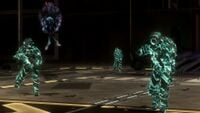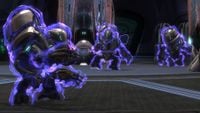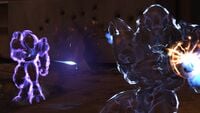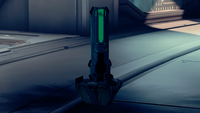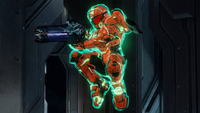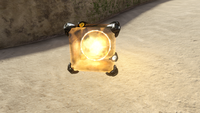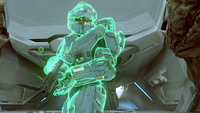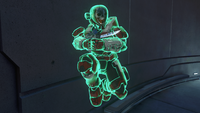Overshield
From Halopedia, the Halo wiki
An overshield is a form of Covenant-developed technology that strengthens the user's energy shielding system.
Overview
The overshield technology was developed to enhance the Covenant's Sangheili warriors' personal shielding system. Although designed in mind for the Covenant shielding system, the technology can also be used by anyone utilizing a personal shielding system such as a Spartan in a MJOLNIR armor.
Gameplay
In Halo: Combat Evolved and Halo 2, the overshield boosts the player's shields to 300%. This was reduced to 200% in Halo 3. In Halo: Reach's Anniversary Map Pack, the shields are once again boosted to 300%; however players now spout a trail of flames, further revealing their position. The trail also forms if the player enters a vehicle. Halo 4 removed the flames and once again boosts the shields only 200%. The overshield in Halo 5: Guardians adds one additional layer, although this layer actually has 300% the strength of the ordinary shields, effectively boosting the player's shields to a massive 400%.
In campaign mode, the overshield is reduced only when the player takes damage.[1][2] In multiplayer, the overshield is not only subjected to the same rule in campaign mode but also gradually depletes over time. Due to its reductive nature, the overshield is only useful for a short period in multiplayer; the overshield slowly loses its strength over prolonged duration. Like the standard energy shield, the overshield can be fully depleted by an overcharged Plasma Pistol.
It takes approximately three seconds to overcharge the energy shields once picked up. During this short period, the player is invulnerable to all forms of attacks, save for a melee attack from behind. The player's normal shield does not take damage until the overshield is completely depleted (although any damage overlapping from something destroying the overshield such as an explosion from a grenade will also do damage to the player's normal shield). In Halo 5: Guardians, the overshield's effects are instantly applied briefly after the player activates the power-up, although the player is still vulnerable while waiting for the shields to be overchaged.
In Halo 2, Halo 3, and Halo 4, the wearer is awarded a visual effect which gives off a full-body glowing effect. This visual effect negates the effects of an active camouflage and makes the wearer more visible to other players, often drawing unwanted attention. This glowing effect is also present in Halo 5: Guardians, although it should be noted that unlike in previous titles, it is actually hidden by the effects of active camouflage despite what the player's HUD may lead one to believe.
When provided by an Engineer, overshielding is either white or purple. White overshielding functions almost identically to traditionally energy shields, and is also able to be routed into protection for vehicles, as shown by Vergil's modifications to an Oliphant in New Mombasa. Purple energy shielding is somewhat weaker, as the shield fades on and off the wearer at various intervals. It also does not reduce recoil, meaning that enemies without shields underneath, such as Unggoy, will still react as if they have no shields when shot, albeit with more health.
Appearances
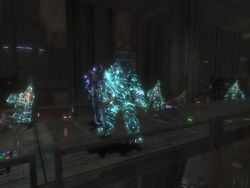
In Halo: Combat Evolved, the overshield appears as a glowing red orb of energy encased in a clear glass cube. The same design is used in Halo 2; this time, however, the orb and cube are gold in color. The design of the overshield in Halo 3 differs and shares some resemblances from previous titles: the orb appears as a glowing red orb of energy, larger than in previous appearances and without a glass cube encasing it. Though left out of the original game, the overshield appears in Halo: Reach's Anniversary Map Pack in "Anniversary" gametypes; its physical appearance is similar to that in Halo 3.
After picking up an overshield in Halo: Combat Evolved and Halo 2, the player's HUD shield display receives two additional layers of shield: first red then green atop the player's usual blue shield. In Halo 3 multiplayer, the standard overshield pickup only grants a single green layer of extra protection. In Reach's Anniversary and custom maps it once again grants two full layers, this time purple atop green. In Reach the player will also leave a trail of flames on the ground as they walk; this effect, known as "Super Shields," is default in matchmaking, but can be disabled in custom games under the gametype options.
Halo 4 features the overshield in a different capacity than in previous games. Rather than only being found on the map, the overshield can be earned though ordnance drops. Rather than an orb, it appears as a green upright slab of metallic material. It adds a single green layer of protection. A player will also earn an overshield in certain circumstances in specific gametypes. For example, earning a Kingtacular in Regicide or finding yourself in a Last Stand in Dominion will result in players automatically equipping an overshield.
The overshield pick-up can only be found in campaign mode in Halo: Combat Evolved. It is absent from the Halo 2 and Halo 4 campaigns, and in Halo 3's campaign it is replaced by Invincibility. The overshield makes an appearance in the Halo 3: ODST and Halo: Reach campaigns as a shielding effect awarded to those within the vicinity of an Engineer; friendly Covenant and UNSC units are provided an additional layer of protection because of the overshield ability.
The overshield is found in Halo: Spartan Assault as a reusable armor ability. When used it is active for five seconds and requires a five-second cooldown period. Overshield is one of the three armor abilities which are not available by default, but instead can be purchased before starting each level to provide the player with an added advantage. A single-level use of the overshield costs 400 XP or 10 cR.
Halo 5: Guardians features the overshield in both campaign and multiplayer. The effects of the overshield are automatically applied in campaign when a Spartan is revived by or revives another Spartan. In multiplayer, the power-up appears in the form of a small piece of circular equipment that emits a hologram of a green cross when on the ground. Unlike in previous titles, it does not immediately activate when touched by a player; instead, it must be manually picked up when walking over it. Doing this will play a short animation during which the player can still take damage. Like other power-ups, it can be acquired at a requisition station in Warzone, but does not appear naturally in that game mode.
Trivia
Production notes
- The Overshield as well as active camouflage were requested by Hardy LeBel as a feature for Combat Evolved's multiplayer. The team working on the campaign saw that they were and added them too.
Miscellaneous
- The Black Eye skull in Halo 2 allows the player to achieve overshields through meleeing enemies which restores the player's shield.
- In Halo 3, you can pick up the overshield (or active camouflage) as equipment if you have a piece of equipment and hold your equipment change button (default RB) and barely touch the overshield. Then if you die you drop the overshield, or if you pick up another piece of equipment you will drop/pickup the overshield, allowing you to surprise your enemies. This only works on matchmaking.
- The overshield was most likely inspired by a similar device found in the Marathon series. Using this device in the Marathon Series causes up to two additional layers of heath to be added (yellow/purple).
- Interestingly, the overshield in Halo 5: Guardians can be stacked. Although there appears to be no visual difference, additional overshields do in fact increase the strength of the additional shields. In-depth information can be found in this video.
- Also, in Halo 5: Guardians' campaign, activating the Black Eye skull disables all overshields, in contrast to Halo 2.
Gallery
Concept art
Concept art of the Overshield Power-up in Halo 4.
Screenshots
Huragok-supplied shielding on Unggoy Ultras in the Halo: Reach level Long Night of Solace.
A SpecOps Sangheili with active camouflage with Huragok-supplied shielding.
An overshield in Halo 2: Anniversary multiplayer.
Frederic-104 with an overshield after reviving John-117 in the Halo 5: Guardians campaign.
Halo 5: Guardians REQ cards
List of appearances
- Halo: Combat Evolved (First appearance)
- Halo 2
- Halo 3
- Halo 3: ODST
- Halo: Reach
- Halo: Combat Evolved Anniversary
- Halo 4
- Halo: Spartan Assault
- Halo 2: Anniversary
- Halo: Spartan Strike
- Halo 5: Guardians
- Halo Wars 2
- Halo: Official Spartan Field Manual (Mentioned only)
- Halo Infinite
Sources
|
| |||||||||||
